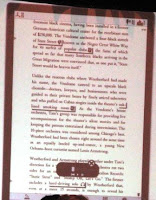The second full day of programming at DBW further emphasized the importance of consumer data for publishers. In a morning presentation, BISG (Book Industry Study Group, Angela Bole) and Bowker (Kelly Gallagher) revealed some demographic features of the e-book consumer. Firstly, according to Bowker, "power buyers" are apparent and very important. Constituting about 20% of buyers overall, these avid readers are most often women, aged 30-44, and they purchase e-books weekly. They are urban or suburban, and their overall profile is similar to that of the print buyer (i.e., not a new category of book consumers). They purchase books on impulse, as one often does in a bookstore.

An enthusiastic presentation on consumer sales data followed, kicked off by Bob Kohn of Royalty Share, Inc. (RoyaltyShare's Digital Advantage product was adopted by Faber and Faber to consolidate e-book sales reporting from over thirty resellers, as announced Tuesday). Kohn encouraged publishers to seek and acquire consumer demographic information from retail partners, including zip code and customer ID. The ID would allow publishers to deploy promotions to specific customers based on their past purchases without the need for their names and email addresses.
Michael Tamblyn from Kobo, speaking on the same panel, described his company's passion for data and the need to act quickly on weekly, daily, or even hourly trends. Kobo portrays an openness to sharing data with publishers, undoubtedly a point in their favor when publishers consider resource allocation. Tamblyn described a "steady heartbeat" of core sales data received by publisher partners, as well as Kobo's willingness to research trends for publishers, "across weeks and days, frontlist versus backlist."
 Even a breakout session on metadata, one of the more practical, less "social" aspects of publishing, referenced the importance of user (reader) experience. Comparing the unrestrained inclusivity of enhanced metadata to the Wild West, presenters agreed that reader comments on Facebook et al. should be reviewed and perhaps harnessed by publishers as part of the overall "consumer facing" data package for books. The appearance of linked publisher content on these sites is also a metadata concern: the tagging of appropriate images, blurbs, reviews, etc. is critical to increasing discoverability.
Even a breakout session on metadata, one of the more practical, less "social" aspects of publishing, referenced the importance of user (reader) experience. Comparing the unrestrained inclusivity of enhanced metadata to the Wild West, presenters agreed that reader comments on Facebook et al. should be reviewed and perhaps harnessed by publishers as part of the overall "consumer facing" data package for books. The appearance of linked publisher content on these sites is also a metadata concern: the tagging of appropriate images, blurbs, reviews, etc. is critical to increasing discoverability.





